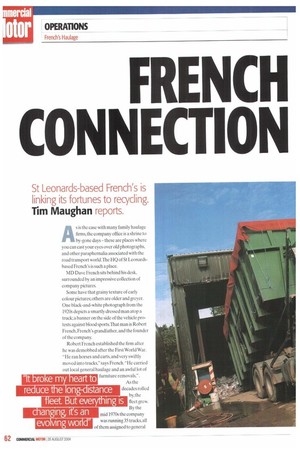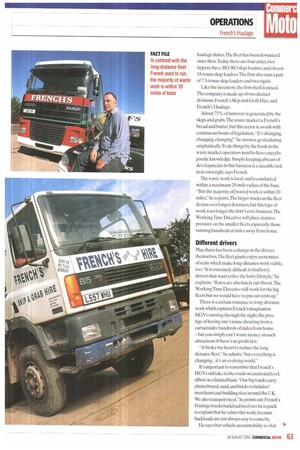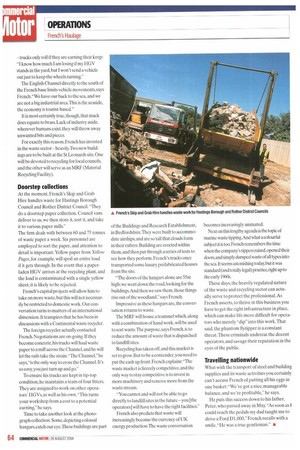FRENCH CONNECTION
Page 62

Page 63

Page 64

If you've noticed an error in this article please click here to report it so we can fix it.
St Leonards-based French's is linking its fortunes to recycling.
Tim Maughan reports.
As is the case with many family haulage firms, the company office is a shrine to by-gone days— these are places where you can cast your eyes over old photographs, and other paraphernalia associated with the road transport world.The HQ of St Leonardsbased French's is such a place.
MD Dave French sits behind his desk, surrounded by an impressive collection of company pictures.
Some have that grainy texture of early colour pictures; others are older and greyer. One black-and-white photograph from the 1920s depicts a smartly dressed man atop a truck; a banner on the side of the vehicle protests against blood sports.That man is Robert French,French's grandfather. and the founder of the company.
Robert French established the firm after he was demobbed after the First World War. "He ran horses and carts, and very swiftly moved into trucks," says French. "He carried out local general haulage and an awful lot of furniture removals.".
As the decades rolled by, the fleet grew. By the mid 1970s the company was running 35 trucks, all of them assigned to general haulage duties.The fleet has been downsized since then.Today there are four artics, two tippers. three RU-RU skip-loaders, and eleven 18-tonne skip-loaders.The firm also runs a pair of 7.5-tonne skip-loaders and two rigids.
Like the inventory, the firm itself is mixed. The company is made up of two distinct divisions: French's Skip and Grab Hire, and French's Haulage.
About 750/,, of turnover is generated by the skips and grabs.The waste market is French's bread and butter, but this sector is awash with continuous bouts of legislation." It's changing, changing, changing!" he stresses, gesticulating emphatically. To do things by the book in the waste market operators need to have encyclopaedic knowledge. Simply keeping abreast of developments in this business is a sizeable task in its own right, says French.
The waste work is local, and is conducted within a maximum 20-mile radius of the base. "But the majority of [waste] work is within 10 miles," he reports.The larger trucks in the fleet do run over longer distances, but this type of work is no longer the firm's core business.The Workinglime Directive will place massive pressure on the smaller fleets, especially those running hundreds of miles away from home.
Different drivers
Plus, there has been a change in the drivers thernselves.The fleet giants enjoy economies of scale which make long-distance work viable, too. "It is extremely difficult to find lorry drivers that want to live the lorry lifestyle," he explains. "Rates are absolutely cut-throat.The Working Time Directive will work for the big fleets but we would have to put our costs up."
There is a certain romance to long-distance work which captures French's imagination. HGVs running through the night, the prestige of having one's name shouting from a curtainsider hundreds of miles from home — but you simply can't waste money on such attractions if there's no profit in it.
*. It broke my heart to reduce the long distance fleet," he admits,-but everything is changing... it's an evolving world."
It's important to remember that French's HGVs still take to the roads on a national level, albeit on a limited basis."Our big trucks carry plasterboard, sand, and bricks to builders' merchants and building sites around the UK. We also transport steel," he points out. French's Haulage trucks backload steel too; he is quick to explain that he values this work, because backloads are not always easy to come by.
He says that vehicle accountability is vital — trucks only roll if they are earning their keep: "I know how much Jam losing if my HGV stands in the yard, but !won't send a vehicle out just to keep the wheels turning."
The English Channel directly to the south of the French base limits vehicle movements, says French."We have our back to the sea, and we are not a big industrial area.This is the seaside, the economy is tourist-based."
It is most certainly true, though, that muck does equate to brass. Lack of industry aside, wherever humans exist, they will throw away unwanted bits and pieces.
For exactly this reason, French has invested in the waste sector— heavily. Two new buildings are to he built at the St Leonards site. One will be devoted to recycling for local councils, and the other will serve as an MRF (Material Recycling Facility).
Doorstep collections
At the moment, French's Skip and Grab Hire handles waste for Hastings Borough Council and Rother District Council. "They do a doorstep paper collection. Council vans deliver to us, we then store it, sort it, and take it to various paper mills."
The firm deals with between 60 and 75 tonnes of waste paper a week. Six personnel are employed to sort the paper, and attention to detail is important. Yellow paper from Yellow Pages, for example, will spoil an entire load if it gets through. In the event that a paperladen HGV arrives at the recycling plant, and the load is contaminated with a single yellow sheet, it is likely to be rejected.
French's capital projects will allow him to take on more waste, but this will not necessarily be restricted to domestic work. Our conversation turns to matters of an international dimension. It transpires that he has been in discussions with a Continental waste recycler.
The foreign recycler actually contacted French. Negotiations are on-going. If they become concrete, his trucks will haul waste paper to a mill across the Channel, and he will let the rails take the strain. "The Chunnel," he says,-is the only way to cross the Channel. It's so easy,you just turn up and go."
To ensure his trucks are kept in tip-top condition, he maintains a team of four fitters. They are assigned to work on other operators' HG Vs, as well as his own."This turns your workshop from a cost to a potential earning," he says.
lime to take another look at the photograph collection. Some,depicting colossal hangars, catch our eye. These buildings are part of the Buildings and Research Establishment, in Bedfordshire.They were built to accommodate airships, and are so tall that clouds form in their rafters. Building are erected within them, and then put through a series of tests to see how they perform. French's trucks once transported some luxury prefabricated houses from the site.
"The doors of the hangars alone are 55m high:we went down the road, looking for the buildings. And then we saw them, those things rise out of the woodland," says French.
Impressive as these hangars are, the conversation returns to waste.
The MRF will house a trammel which, along with a combination of hand work, will be used to sort waste.The purpose, says French, is to reduce the amount of waste that is dispatched to landfill sites.
Recycling has taken off, and this market is set to grow. But to be a contender, you need to put the cash up front. French explains:"The waste market is fiercely competitive,and the only way to stay competitive is to invest in more machinery and remove more from the waste stream.
"You cannot and will not be able to go directly to landfill sites in the future — you [the operators] will have to have the right facilities."
French also predicts that waste will increasingly become the currency of UK energy production.The waste conversation becomes increasingly animated.
Next on this lengthy agenda is the topic of marine waste tipping.And what a colourful subject it is too.French remembers the time when the company's tippers raised, opened their doors, and simply dumped waste of all types into the sea. It seems astonishing today, but it was standard (and totally legal) practice,right up to the early 1960s.
These days, the heavily regulated nature of the waste and recycling sector can actually serve to protect the professional. As French asserts, to thrive in this business you have to get the right infrastructure in place, which can make life more difficult for operators who merely "dip" into this work. That said, the phantom flytipper is a constant threat.These criminals undercut the decent operators, and savage their reputation in the eyes of the public.
Travelling nationwide
What with the transport of steel and building supplies and its waste activities you certainly can't accuse French of putting all his eggs in one basket: "We've got a nice, manageable balance, and we're profitable," he says.
He puts this success down to his father, Peter, who passed away in May. "As soon as I could reach the pedals my dad taught me to drive a Ford D1,000," French recalls with a smile. "He was a true gentleman." •


























































































































































































